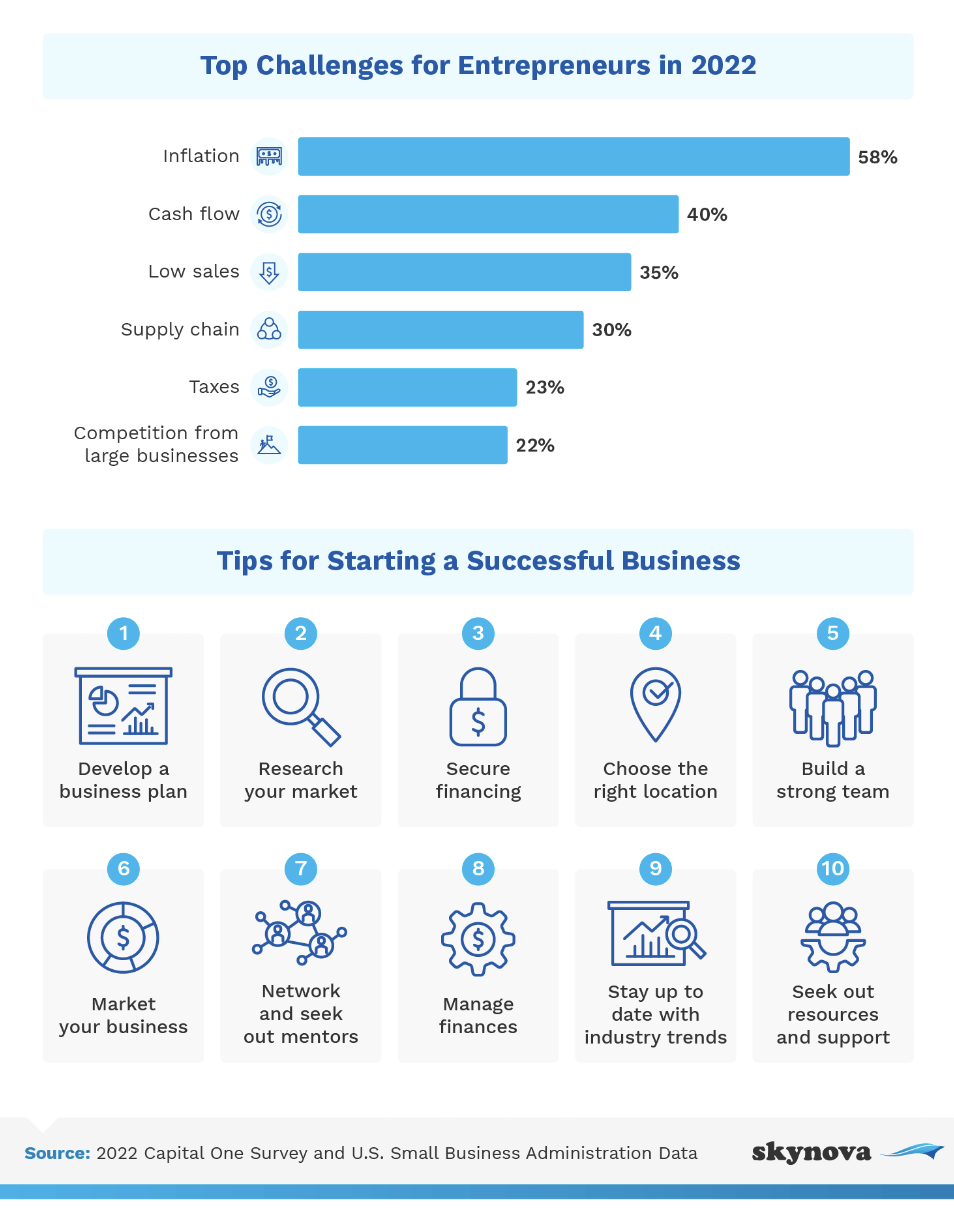Over the last three decades, entrepreneurship has evolved into a globally celebrated career path. As we’ve witnessed an unprecedented number of entrepreneurs rise from humble beginnings to accrue substantial wealth and global recognition, it’s become evident that the entrepreneurial path holds promise for those who dare to tread. It all begins in modest garages or home offices, where ideas are birthed, and innovations take shape. Such success stories have inspired countless individuals to test their inventive capacities and venture into the world of business ownership.
Skynova, a software company with free invoice tools for SMBs, recently analyzed the top key business terms for entrepreneurs. In its simplest terms, entrepreneurship is the act of owning and operating one’s own business. However, at its core, it is an inventive and risky endeavor that revolves around identifying and filling gaps in customer needs with new, original business ideas. Entrepreneurs play the role of risk-takers, committing not only their ideas but also their time, reputation, and financial resources, to make their innovative concepts a reality.

Crucial Business Terminologies: A Guideline for Entrepreneurs
Before embarking on the entrepreneurial journey, it’s vital to understand the business jargon and terminologies that define the business landscape. From “accounts payable” to “venture capital,” the list of business terminologies that an entrepreneur should familiarize themselves with is long and exhaustive. These terms encompass various aspects of running a business, and their understanding equips entrepreneurs with the necessary knowledge to effectively manage their operations, pitch to investors, and guide their human resources.
Terms like “accounts payable” and “accounts receivable” pertain to financial obligations to suppliers and service providers and payments owed by customers, respectively. Understanding these terms allows entrepreneurs to keep track of their financial standings effectively. Understanding who ‘Adopters’ are, their classification, and their role in the adoption of a new product or technology can inform marketing strategies and product development processes.
In the financial realm, concepts like “angel investors,” “assets,” and “bootstrapping” hold significant relevance. While angel investors provide capital in exchange for ownership stakes, bootstrapping refers to self-funding, and assets refer to a company’s items of value. Understanding these terms is crucial in determining the best financial strategies for the startup.
Also, mastering terms like “B2B” and “B2C,” referring to business-to-business and business-to-consumer relationships, respectively, and “business model,” which outlines how a company intends to deliver value to its customers, can guide strategic planning.
Terms such as “cash flow,” “competitive advantage,” and “crowdfunding” are equally important as they pertain to a company’s financial health, strategic positioning, and funding options, respectively. Entrepreneurs should also be familiar with terms relating to cost incurrence, intellectual property, legal responsibilities, financial obligations, and business structures such as “limited liability company” and “sole proprietorship.”
Understanding concepts like “minimum viable product,” “net profit,” “revenue,” “profit margin,” and “return on investment” is vital for entrepreneurs in evaluating their business performance and profitability. Familiarity with terms like “scalability,” “social entrepreneurship,” “target market,” “valuation,” “value proposition,” and “venture capital” is also crucial in guiding strategic planning, securing funding, and fostering growth.
The Entrepreneurial Pathway: From Idea to Reality
For those with an entrepreneurial spirit looking to venture into the business world, the journey typically begins with the conception of an original business idea. It could involve exploring different industries, conducting extensive market research, or identifying gaps in consumer needs. This is followed by the formulation of a business model canvas, which lays the groundwork for a fully developed business model.
Funding is often the next big hurdle. Prospective entrepreneurs can approach financial institutions, seek out angel investors, or explore venture capital funding options. Concurrently, establishing a supportive network composed of friends, family, professionals, partners, vendors, and advisors can provide invaluable guidance.
As the startup takes shape, entrepreneurs often find themselves in need of business incubators that offer shared spaces to minimize operational costs. Marketing and team-building efforts also come into focus once the business is officially launched. A critical aspect of this stage is meticulous financial management, which may require the hiring of professionals.
Adapting to unforeseen challenges by adjusting pricing or reducing operational expenses may be necessary. Additionally, staying updated with industry trends is crucial to maintain relevance in a dynamic market environment. Finally, patience is key. Despite the challenges and lengthy timeline before profitability, the satisfaction of growing an idea into a successful venture makes the entrepreneurial journey truly rewarding.
You may be interested in: The Significance of Entrepreneurship Education for Students in School
